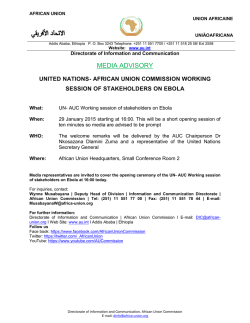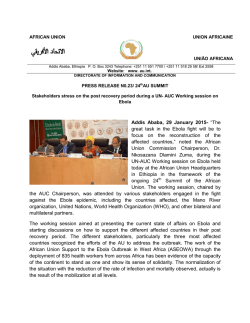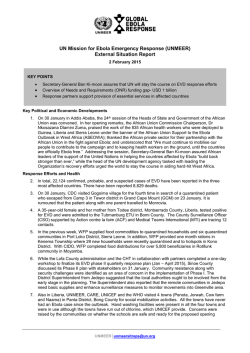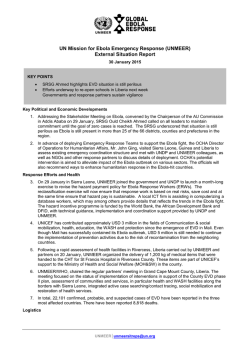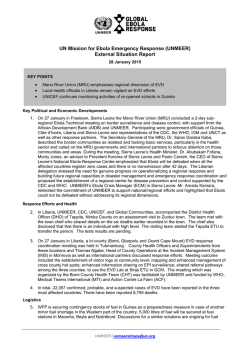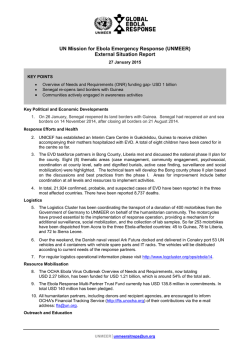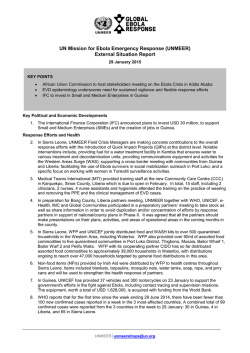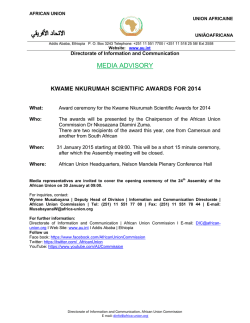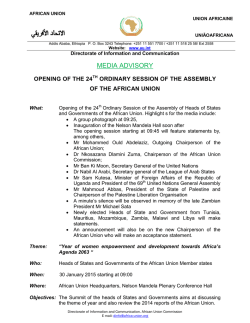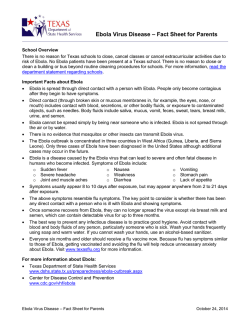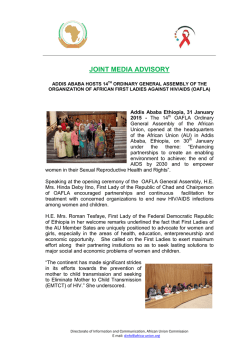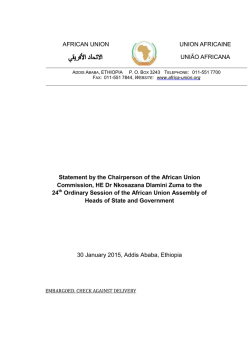
Statement by Ismail Ould Cheikh Ahmed, Special Representative
BRIEFING TO AFRICAN UNION MEETING ON EBOLA BY ISMAIL OULD CHEIKH AHMED ON 29 JANUARY 2015 Your Excellency, Dr. Nkosazana Dlamini Zuma, Chairperson of the African Union Commission, Excellencies, Ladies and Gentlemen, It is a pleasure for me to provide you with a briefing on the progress in the global Ebola response and the activities of UNMEER since I assumed the functions of Special Representative less than three weeks ago. At the onset of the epidemic, Ebola was described as a crisis going beyond health with “grave humanitarian, economic and social consequences that could spread far beyond the affected countries”. Leaders agreed that there was much to be done to ensure that people had the health services, food, water, sanitation and supplies that are urgently needed. Delay would mean an exponential increase in cost and suffering. At the time, credible projections foresaw up to 10.000 cases per week by December. Last September, the UN Secretary-‐General created the United Nations Mission for Ebola Emergency Response (UNMEER) to support the efforts of multiple partners that were becoming involved. At this time the focus of responders was to enable people with Ebola to receive prompt and effective treatment, to ensure those who died had safe and dignified burials, and to engage all communities fully in the response. Early in October, the number of cases had exceeded 7,000: the damage to societies and economies was multiplying and stigmatization of people from the region was on the increase. Poor people – especially artisans and small farmers – were hardest hit. The momentum for the global response led to increased personnel, equipment and supplies being deployed to the region. The African Union responded massively to the call and showed its leadership by offering to mobilise 1000 health workers from around the continent to support national governments both with the response and with the effort to re-‐establish health services. The private sector, especially in Africa, provided multiple contributions – from earth-‐moving equipment to social mobilisation. Since its creation, UNMEER has worked to ensure that all these efforts are coherent and effective, and support one, government-‐led operational framework. UNMEER supports the governments in their role as crisis manager, identifying gaps in the response, and re-‐ directing the efforts of UN system agencies as required. Thanks to the global response, the terrifying scenario did not materialize, and the devastating spread of the disease has slowed. The epidemic has turned, and we are now beginning to see an overall decline in the number of new cases. The situation is still perilous. There is still Ebola in more than 25 of the 66 districts, counties and prefectures in the region. When people have Ebola it can still take them more than five days to be admitted for treatment. And more than half of those newly infected have not been identified as contacts of people known to have the disease. This is a perilous situation and could easily result in flare-‐ups. Too many communities are reticent about being involved in the response – they are frightened about the disease and do not trust the responders. Stopping this outbreak therefore still requires significant additional efforts. The philosophy that will guide my mandate as UNMEER Head and moving forward is defined by what I describe as the three ‘Cs’: Countries – recognising that national governments are in the lead and UNMEER is here to be an enabler for their efforts; Communities – understanding that the work at the level of communities to change behaviours and own the response is what will ultimately turn the tide; and Coordination – that better coordination among all actors is essential and UNMEER has a key role to play in filling gaps through enhanced coordination at regional, national and local levels, as well as across borders. In addition, there are two key cross-‐cutting components of the Ebola response that are crucial for the success of the 3 “C” strategy: Firstly, there is a need to develop a cross-‐border strategy and policies. The fight against Ebola has to be transnational in light of high migration patterns between the affected countries. Secondly, both response and recovery efforts need to be integrated. The current crisis can be turned in an opportunity – the opportunity to create a strengthened and more resilient health system in Africa. In closing, Excellency Madame Chairperson, I would like to share my personal account of my recent visit to Sierra Leone, and the emotion and pride I felt as an African. I would like to acknowledge the amazing work of Dr. John Ssentamu and his team. I recently visited an African Union operated Ebola Treatment Centre in Bombali District, Sierra Leone. I met and was touched by an incredible team of doctors and nurses from all over the continent, led by Dr. John Ssentamu. I was pleased to learn that there were only three patients at the Centre at the time of my visit, including an 8-‐year-‐old girl. She arrived to the Centre in a very critical state and was in a much healthier state when we saw her. It is also important to note that the Centre has achieved incredible survival rates. Since its opening, it has recorded a survival rate of approximately 66 per cent, attesting to the courageous efforts and the dedication of the African Union team. BRIEFING TO AFRICAN UNION MEETING ON EBOLA BY ISMAIL OULD CHEIKH AHMED ON 29 JANUARY 2015 Page 2 of 3 The response efforts show that Africa has valuable assets that it can apply to support responses to outbreaks. Ebola treatment units run by Africans have demonstrated excellent cure rates. African epidemiologists and anthropologists are at the centre of “Getting to Zero”. African physicians and nurses are helping to restart health services. Dr. John and his team are currently assessing how to strengthen the health services in the neighbouring towns and villages. I would like to highlight the personal leadership and engagement of Her Excellency Dr. Nkosazana Dlamini Zuma, Chairperson of the African Union Commission, in deploying a strong team of nurses and doctors to support the response. Their contribution, as evidenced in Sierra Leone, has been invaluable. I really thank the African Union and Africans in general, for their substantive contribution to the response. I also reiterate my personal commitment to strengthening UNMEER’s engagement with our regional and sub-‐regional institutions, such as the African Union, ECOWAs and the Mano River Union. For the fight against Ebola to be sustained, I believe that African leadership and ownership in the response is essential. I ask you all to maintain support till the task is completed. Let us minimize the time needed to end the outbreak and the suffering that it causes. Let us revive the fabric of society. And let us learn and apply lessons so it does not happen again. *** _______________________________________________________________________________ United Nations Mission for Ebola Emergency Response (UNMEER) ebolaresponse.un.org | Facebook: UNMEER | Flickr: UNMEER | Twitter: @UNMEER, #EbolaResponse | YouTube: UNMEER BRIEFING TO AFRICAN UNION MEETING ON EBOLA BY ISMAIL OULD CHEIKH AHMED ON 29 JANUARY 2015 Page 3 of 3
© Copyright 2026
